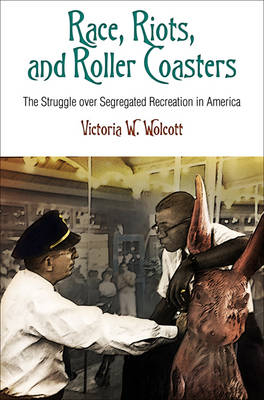
Race, Riots, and Roller Coasters
The Struggle over Segregated Recreation in America
Seiten
2012
University of Pennsylvania Press (Verlag)
978-0-8122-4434-2 (ISBN)
University of Pennsylvania Press (Verlag)
978-0-8122-4434-2 (ISBN)
- Keine Verlagsinformationen verfügbar
- Artikel merken
Race, Riots, and Roller Coasters tells the story of the battle for access to leisure space in cities across the United States. This detailed and eloquent history shows how African Americans fought to enter segregated amusement areas not only in pursuit of happiness but in connection to a wider movement for racial equality.
Throughout the twentieth century, African Americans challenged segregation at amusement parks, swimming pools, and skating rinks not only in pursuit of pleasure but as part of a wider struggle for racial equality. Well before the Montgomery bus boycott, mothers led their children into segregated amusement parks, teenagers congregated at forbidden swimming pools, and church groups picnicked at white-only parks. But too often white mobs attacked those who dared to transgress racial norms. In Race, Riots, and Roller Coasters, Victoria W. Wolcott tells the story of this battle for access to leisure space in cities all over the United States.
Contradicting the nostalgic image of urban leisure venues as democratic spaces, Wolcott reveals that racial segregation was crucial to their appeal. Parks, pools, and playgrounds offered city dwellers room to exercise, relax, and escape urban cares. These gathering spots also gave young people the opportunity to mingle, flirt, and dance. As cities grew more diverse, these social forms of fun prompted white insistence on racially exclusive recreation. Wolcott shows how black activists and ordinary people fought such infringements on their right to access public leisure. In the face of violence and intimidation, they swam at white-only beaches, boycotted discriminatory roller rinks, and picketed Jim Crow amusement parks. When African Americans demanded inclusive public recreational facilities, white consumers abandoned those places. Many parks closed or privatized within a decade of desegregation. Wolcott's book tracks the decline of the urban amusement park and the simultaneous rise of the suburban theme park, reframing these shifts within the civil rights context.
Filled with detailed accounts and powerful insights, Race, Riots, and Roller Coasters brings to light overlooked aspects of conflicts over public accommodations. This eloquent history demonstrates the significance of leisure in American race relations.
Throughout the twentieth century, African Americans challenged segregation at amusement parks, swimming pools, and skating rinks not only in pursuit of pleasure but as part of a wider struggle for racial equality. Well before the Montgomery bus boycott, mothers led their children into segregated amusement parks, teenagers congregated at forbidden swimming pools, and church groups picnicked at white-only parks. But too often white mobs attacked those who dared to transgress racial norms. In Race, Riots, and Roller Coasters, Victoria W. Wolcott tells the story of this battle for access to leisure space in cities all over the United States.
Contradicting the nostalgic image of urban leisure venues as democratic spaces, Wolcott reveals that racial segregation was crucial to their appeal. Parks, pools, and playgrounds offered city dwellers room to exercise, relax, and escape urban cares. These gathering spots also gave young people the opportunity to mingle, flirt, and dance. As cities grew more diverse, these social forms of fun prompted white insistence on racially exclusive recreation. Wolcott shows how black activists and ordinary people fought such infringements on their right to access public leisure. In the face of violence and intimidation, they swam at white-only beaches, boycotted discriminatory roller rinks, and picketed Jim Crow amusement parks. When African Americans demanded inclusive public recreational facilities, white consumers abandoned those places. Many parks closed or privatized within a decade of desegregation. Wolcott's book tracks the decline of the urban amusement park and the simultaneous rise of the suburban theme park, reframing these shifts within the civil rights context.
Filled with detailed accounts and powerful insights, Race, Riots, and Roller Coasters brings to light overlooked aspects of conflicts over public accommodations. This eloquent history demonstrates the significance of leisure in American race relations.
Victoria W. Wolcott is Professor of History at the University at Buffalo, SUNY, and the author of Remaking Respectability: African-American Women in Interwar Detroit.
Introduction
Chapter 1. A Tarnished Golden Age: Race and Recreation Before World War II
Chapter 2. The Fifth Freedom: Racial Liberalism, Nonviolence, and Recreation Riots in the 1940s
Chapter 3. "A Northern City with a Southern Exposure": Challenging Recreational Segregation in the 1950s
Chapter 4. Violence in the City of Good Neighbors: Delinquency and Consumer Rights in the Postwar City
Chapter 5. Building a National Movement: Students Confront Recreational Segregation
Chapter 6. "Riotland": Race and the Decline of Urban Amusements
Conclusion
Notes
Index
Acknowledgments
| Erscheint lt. Verlag | 3.8.2012 |
|---|---|
| Reihe/Serie | Politics and Culture in Modern America |
| Zusatzinfo | 18 illus. |
| Verlagsort | Pennsylvania |
| Sprache | englisch |
| Maße | 152 x 229 mm |
| Themenwelt | Geisteswissenschaften ► Geschichte ► Regional- / Ländergeschichte |
| Sozialwissenschaften ► Politik / Verwaltung ► Politische Theorie | |
| ISBN-10 | 0-8122-4434-6 / 0812244346 |
| ISBN-13 | 978-0-8122-4434-2 / 9780812244342 |
| Zustand | Neuware |
| Informationen gemäß Produktsicherheitsverordnung (GPSR) | |
| Haben Sie eine Frage zum Produkt? |
Mehr entdecken
aus dem Bereich
aus dem Bereich


